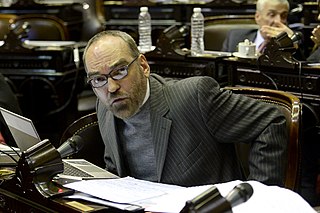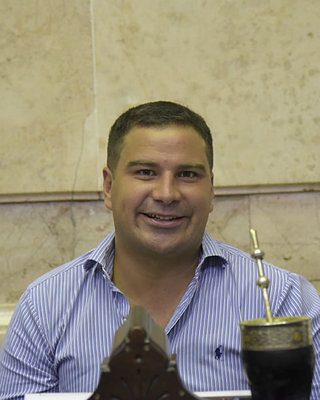
Eduardo Alberto Duhalde is an Argentine former peronist politician who served as the interim President of Argentina from January 2002 to May 2003. He also served as Vice President and Governor of Buenos Aires in the 1990s.

Adolfo Rodríguez Saá is an Argentine Peronist politician. Born in a family that was highly influential in the history of the San Luis Province, he became the province's governor in 1983, after the end of the National Reorganization Process military dictatorship. He remained governor up to 2001, being re-elected in successive elections.

The Justicialist Party is a major political party in Argentina, and the largest branch within Peronism.

The Neuquén People's Movement is a Peronist provincial political party in Neuquén, Argentina.

The Communist Party (Extraordinary Congress) (Spanish: Partido Comunista (Congreso Extraordinario), PCCE) is an Argentine communist party that advocates for Marxist-Leninist ideals. The PCCE is a part of the Unión por la Patria (formerly Frente de Todos), a Peronist coalition in Argentina which currently supports President Alberto Fernández. Its name was adopted after a dispute with the Communist Party of Argentina caused a division between its members, resulting in the organization of an extraordinary congress that gave way to the foundation of the PCCE between December 1–2, 1996.

Alberto José Rodriguez Saá is an Argentine lawyer and politician. He is the Governor of San Luis Province. He was presidential candidate for the center-right peronism, Federal Peronism, in 2007 and 2011.

Argentina held national presidential and legislative elections on Sunday, 28 October 2007, and elections for provincial governors took place on staggered dates throughout the year. For the national elections, each of the 23 provinces and the Autonomous City of Buenos Aires are considered electoral districts. Voter turnout was 76.2%. Buenos Aires Province Senator and First Lady Cristina Fernández de Kirchner of the Front for Victory won the election by 45.28% of votes against Elisa Carrió of Civic Coalition ARI, making her the second female president of Argentina and the first female president to be directly elected. She broke the 40 percent barrier and won in the first round. Elisa Carrió won in the city of Buenos Aires and came second with more than 20 percent of the votes. Third was Roberto Lavagna, who won in Córdoba.

Kirchnerism is an Argentine political movement based on populist ideals formed by the supporters of spouses Néstor Kirchner and Cristina Fernández de Kirchner, who consecutively served as Presidents of Argentina. Although considered a branch of Peronism, it is opposed by some factions of Peronists and generally considered to fall into the category of left-wing populism.

Roberto Gustavo Basualdo is an Argentine politician, formerly of the Justicialist Party (PJ), now in Cambiemos. He sat in the Argentine Senate representing San Juan Province (Argentina) for the Production and Labour party from 2005 to 2023.

Liliana Alonso is an Argentine Justicialist Party (PJ) politician. She was a National Senator representing San Luis Province in the Federal Commitment bloc from 2001 to 2017.

General elections were held in Argentina on Sunday, 23 October 2011. Incumbent president Cristina Fernández de Kirchner of the Front for Victory won in a landslide, with 54.11% of the vote, securing a second term in office. The Front for Victory won just over half of the seats in the National Congress.

Federal Peronism, also known as Dissident Peronism, is the faction or branch of either moderate, centrist or right-wing Peronism, that is currently identified mostly by its opposition to Kirchnerism, the left-wing faction of Peronism.

The Federal Popular Union, formerly the Popular Union until 2020, is a centre-right political party in Argentina rooted in Peronism. Established by Juan Atilio Bramuglia as a contingency for Peronists displaced by the 1955 military coup against the populist President Juan Perón, it became a "neo-Peronist" alternative to the exiled leader's line, and subsequently, an alternative to the successive dominant factions in the Justicialist Party.

Claudio Javier Poggi is an Argentine accountant and peronist politician. From 2017 to 2021, he sat in the Argentine Senate representing San Luis, the province he led as governor from 2011 to 2015. He currently serves as a National Deputy since 2019, and previously held the same office from 2003 to 2009.

The Renewal Front is a Peronist political party in Argentina led by Sergio Massa, who is part of the centre-left political coalition Union for the Homeland. Massa is a Peronist and said he wants to "build the Peronism of the 21st century".
The Frente de Todos was a centre-left political coalition political parties in Argentina formed to support President Alberto Fernández and Vice President Cristina Kirchner.

The Patria Grande Front is a leftist political front in Argentina founded by activist and social leader Juan Grabois. It was founded in October 2018, ahead of the 2019 Argentine general election, in support of the candidacy of Cristina Fernández de Kirchner and in opposition to the government of Mauricio Macri. As of October 2020 it did not count with official party status nationwide.

Fernando Adolfo Iglesias is an Argentine journalist, writer, politician, and volleyball player. Currently he is a National Deputy elected in Buenos Aires. He is a member of the center right party Republican Proposal.

Nicolás Marcelo Rodríguez Saá is an Argentine politician who served as a National Deputy from 2019 to 2021. He is a member of the Justicialist Party.

The Union for the Homeland is a centre-left political and electoral coalition of Peronist political parties in Argentina, formed to compete in the 2023 general election. The coalition is a successor to the previous Frente de Todos coalition, whose candidate in the 2019 presidential election, Alberto Fernández, was successfully elected President of Argentina.




















